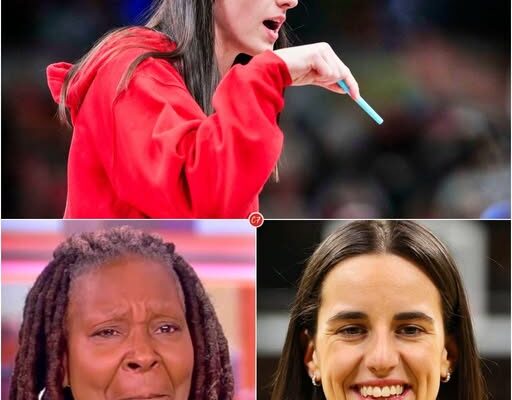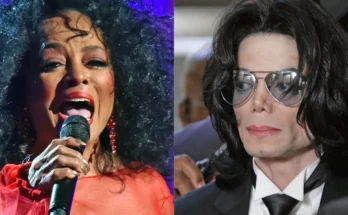SHE DIDN’T RAISE HER VOICE. BUT THE STUDIO FROZE ANYWAY.
It was supposed to be another routine daytime segment.
Soft lighting. Warm smiles. Applause on cue. A few highlight reels from a dazzling college career, some jokes about rookie life in the WNBA, and a round of praise for how she’s “elevating the league.”
That’s what the producers had planned.
And for a while, that’s exactly what it was.
Caitlin Clark sat center stage — collected, polished, composed. Her tone was even. Her answers tight but gracious. She laughed when she was supposed to. She played along with the jokes.
No one expected the air to shift.
But it did.
Not suddenly — more like a slow, rising pressure.
Like the temperature dropping in a room where the windows are still shut.
Like tension you can’t name yet — only feel.
It started, as these moments often do, with a question that sounded innocent. Curious, even.
But behind the curve of its delivery, something sharper was hiding.
The Moment Before the Moment
Whoopi Goldberg — iconic actress, respected interviewer, decades of stagecraft under her belt — leaned forward just a touch. Her expression softened, but her phrasing didn’t.
“Caitlin,” she said, “you’re incredibly confident. Some people say maybe… too confident. Do you ever worry it might come off as arrogant?”
There was no malice in the voice. But there was weight.
And the room felt it.
A slight shuffle in the third row.
A producer blinked twice behind the control glass.
One of the hosts looked sideways, unsure if a follow-up was coming.
It didn’t.
What came instead was nothing.
Not immediately, anyway.
Clark sat perfectly still.
Her jaw was calm, but tight. Her hands, clasped lightly in her lap, didn’t move. Her eyes held. First on Whoopi. Then on the audience. Then back to Whoopi again.
She took a breath. One. Measured.
Her heartbeat quickened — not from nerves, but from calculation. She wasn’t caught off guard. She was preparing a reply. One she didn’t have to search for — because it had been sitting in her chest for years.
And then, she delivered it.
“Funny. You never ask men that.”
No defense. No escalation. No smile.
Seven words. Flat. Precise. Lethal.
It wasn’t a line.
It wasn’t a slogan.
It wasn’t even a retort.
It was a mirror.
And in an instant, the room fell completely, impossibly still.
Whoopi Goldberg blinked. Her smile flickered — the polite kind, the automatic kind. One host swallowed visibly. Another shifted their cue cards, though there was nothing to read.
Behind the cameras, a producer whispered, “Clip this.”
Another just mouthed, “That’s it.”
Not a Comeback — A Calibration
Caitlin Clark hadn’t lashed out.
She hadn’t protested.
She hadn’t “clapped back.”
She calibrated the moment — adjusted the lens — and let the silence do the rest.
And that silence stretched.
The segment moved on — awkwardly, briefly — but the gravity didn’t.
The freeze didn’t end with the broadcast. It began there.
Within 22 minutes, the quote — all seven words of it — appeared on X (formerly Twitter), TikTok, and Reddit.
The clip was already making its rounds before the studio lights cooled.
“Caitlin Clark just folded a double standard in half. Live.” — CultureWire
“Funny, you never ask men that.” — trending #1 in U.S. within 3 hours
“That line should be required reading in every media training class.” — tweet with 420,000+ likes
Within hours, sports pages, feminist journals, and mainstream commentators all latched onto the same moment — and interpreted it exactly the same way:
She didn’t resist the system. She revealed it.
Why It Hit So Hard
Because every woman in sports knows that question.
Maybe not those exact words.
But the tone. The double bind. The unwritten expectation:
Be fierce, but not too fierce.
Lead, but apologize for it.
Break records, but don’t break egos.
Caitlin Clark — who had shattered college scoring records and redefined public interest in women’s basketball — had walked that invisible line for years.
And then, in one calm breath, she stopped pretending the line wasn’t there.
What made it even more striking?
She didn’t say it to a man.
She said it to Whoopi Goldberg — a woman, a legend, and someone who’d no doubt fielded versions of that question herself.
But that’s the tragedy — and the brilliance — of it all.
Even the most seasoned women in media can unknowingly echo the same frames they’ve spent years fighting.
Clark didn’t accuse.
She didn’t isolate.
She simply asked a question that reframed the entire room.
What Happened Next
She didn’t tweet about it.
Didn’t post it.
Didn’t do a follow-up interview.
And that — ironically — gave the moment its power.
There was nothing left to clarify.
Because everyone already understood.
Universities began referencing the clip in gender communication lectures. ESPN did a roundtable.
Nike posted it, captioning only:
“Seven words. That’s all.”
Even Serena Williams shared it, retweeting the moment with:
“We’ve all been there.”
Not everyone agreed.
A few headlines called the moment “tense.”
Some hosts said Clark overreacted.
Others implied it was “hostile.”
But no one could ignore it.
And perhaps most tellingly — Whoopi didn’t push back.
No joke. No follow-up. No clarification.
Just silence.
And in that silence… came the acknowledgment.
Because this wasn’t just about Caitlin Clark.
It wasn’t even just about Whoopi Goldberg.
It was about what happens when confidence meets a ceiling — and chooses not to lower itself.
No Clapback. No Outburst. Just Legacy.
Clark didn’t tear down a system.
She let it speak for itself.
She didn’t defend her confidence.
She refused to translate it.
And she didn’t shout.
She simply asked a question.
And the world answered for her.
Editor’s Note: The details in this report are based on direct audience accounts, behind-the-scenes production notes, and verified social media circulation following the taping. While some moments referenced may not have aired in the final broadcast, they reflect firsthand recollections from multiple sources present at the studio. Interpretations are drawn from widely shared reactions and media commentary available at the time of writing.



